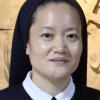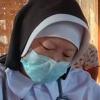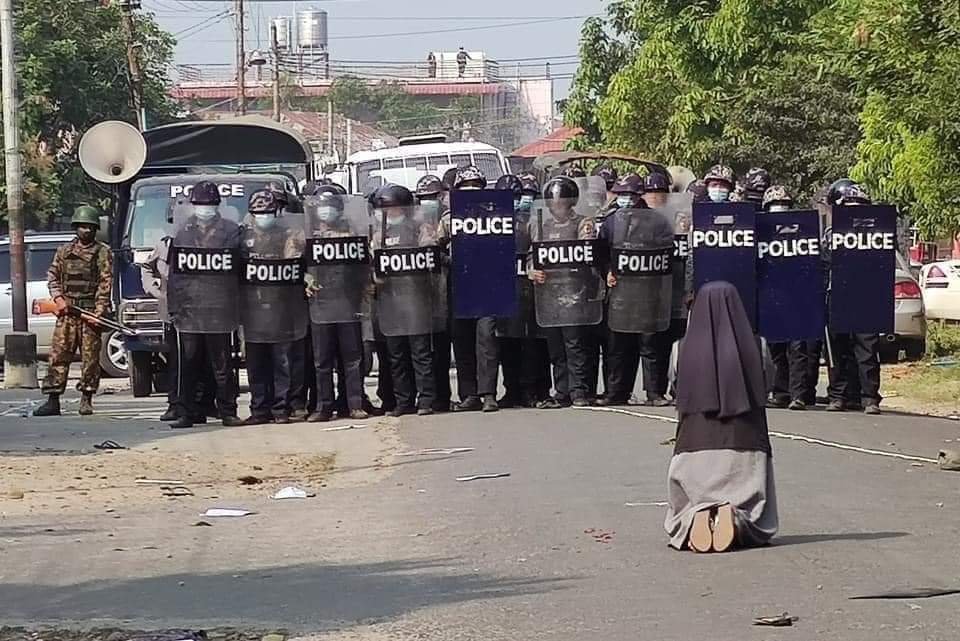
Sr. Ann Nu Thawng, a member of the Sisters of St. Francis Xavier, kneels in front of police and soldiers during an anti-coup protest Feb. 28 in Myitkyina, Myanmar. (CNS/Courtesy of the Myitkyina News Journal)
Editor's note: Sr. Sung Hee Moon of Korea has been in contact with Sr. Ann Nu Tawng, the sister in Myanmar whose photo begging soldiers to not shoot protestors went viral earlier this year. Moon conveyed information from Tawng in this column, which we are publishing with two bylines in honor of Tawng's courage in writing despite the challenges she faces. Her longer responses are noted in insets throughout the column.
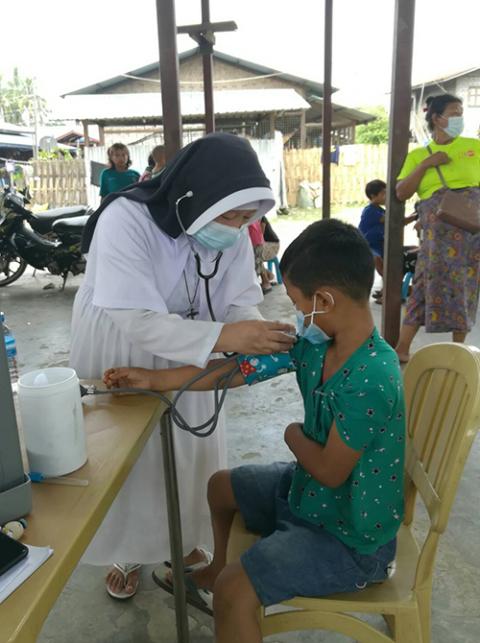
Sr. Ann Nu Tawng does a health assessment of a child in the Mali Gindai Clinic in Myanmar. (Courtesy of Sr. Ann Nu Tawng)
Xaverian Sr. Ann Rose Nu Tawng was the subject of the heroic images that went viral amidst the Myanmar military's violent crackdown on the Civil Disobedience Movement earlier this year. My interest grew even more when I learned that she is an ordinary woman religious in her mid-40s, just as I am. It took me courage to contact her, as I am a total stranger, while she was known to everyone in the world by the photos, if not her name.
Waiting for her reply to my proposal for an online interview I worried that contact with her might cause her some trouble — she had already had enough attention, including from the police. Her personal life has already been disrupted by so many events, and her security cannot be assured. Despite the instability of her life and ministry, she finally said, "I'm so busy going around [to] IDPs (internally displaced persons) camps, but I will try to find time to answer your questions."
Since their independence from Britain in 1948, the people of Myanmar have suffered the longest civil war in history. Like many others in the country, Sr. Ann has childhood memories of evacuating her hometown during tribal wars.
I learned that she is a nurse, currently working for a clinic. She has delivered hundreds of babies so far — births and deaths are her everyday experience. With public hospitals closed after health care workers left in protest against the coup, she is doing extra jobs these days, caring for the sick in internally displaced persons camps.
"I was surprised to find that the photo of me crying and begging the soldiers not to kill people went viral. At that time, people ran for their life in fear amid shootings. Speaking of how the photo was taken, a young man who was hiding near the clinic wondered why there was a sudden silence and checked out the situation. He saw a nun kneeling in front of soldiers and took some photos, then ran away. I haven't met this young man before, but he came back to introduce himself to me saying he is a Buddhist youth. And he said that he had posted the photos online.
Anyway, God gave the people of Myanmar the opportunity to let the world know about the situations, difficulties, and cries. I could do such a thing because God blessed me and used me as His tool and the Holy Spirit also blessed me with courage. ... I was using my own life to delay the time so that the young (people) could have time to run away. That was a small act, but by doing this with big love, this act appealed to the international community and got publicity. I deeply feel that this was also God who wanted the world to know the situations in Myanmar. God wants the international communities to do something to save Myanmar and stop killing as the regime took life aiming to the head only by the snipers and killed people inhumanly."
She said she couldn't help crying when reminded of that March 8, a week after she successfully helped young protesters flee the soldiers.
"In front of my eyes, one protester was shot to death, exploding his head and died in the blood pool. Wounded patients were brought to the clinic so the blood was everywhere inside the clinic. When two patients with heads exploded were brought, they had already died then. Others were wounded seriously like a bloody battleground."
I remembered a story that one of our Korean sisters in Yangon shared. Early in April she was volunteering as a nurse at protest sites. She was in a square where a crowd of protesters was encircled by armed soldiers who were surrounded by another group of democracy supporters, and later all of them got hemmed in by another group of soldiers. An armed soldier turned toward her, and recalling it, she said: "I cannot help crying whenever the scene hits my mind." I worried about Sr. Ann's safety after she became an iconic figure who must be a pain in the neck for the police and soldiers.
"There are things I cannot share openly at this moment, but I have to keep them in my heart. The regime can come and arrest me anytime. I have to rely on God always and pray to Him. I always open up to Him and ask His assistance."
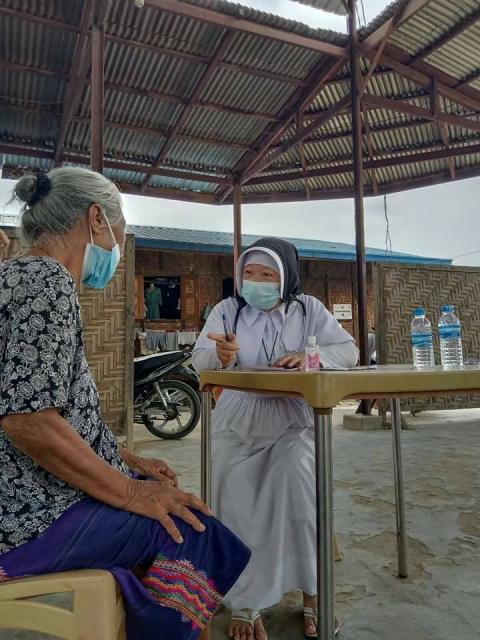
Sister Ann helps an elder in the Myanmar clinic. (Courtesy of Sr. Ann Nu Tawng)
Nine months after the coup and numerous disastrous stories of lost loved ones, the Tatmadaw (Myanmar military) does not seem any closer to relinquishing power. While protests in major cities like Yangon and Mandalay have gone underground, tribal-based soldiers are fighting the military administration and people in rural areas have sought refuge in a jungle.
When Sr. Ann shared about the situation there in June, she said, "People feel more scared for the coup regime than COVID-19." However, the virus became a stronger threat when the third wave arose in her town, Myitkyina, during which seven or eight of ten tested positive for COVID-19. Patients with severe symptoms could not access government medical systems or get oxygen tanks because the military took them for themselves.
"I was reflecting on what is happening in our country, and I felt so sad and cried. The hunger for power costs the lives of many innocent lives. When I go to IDP camps, I observe many people facing a lot of difficulties, stresses to survive as there are no livelihood opportunities. I always think about how I can be of help to the people. ... Sometimes I help deliver oxygen and medicine to those who need it, in consultation with the doctors. Sometimes some communities or people in remote areas wanted to test for COVID-19, so I went to them for testing. The cases beyond my capacity are being referred to other service providers accordingly. I do my best with all my passion and I leave the rest in God's hands."
Advertisement
When a confirmed patient cannot self-isolate at home, she also arranges places to stay and sends them to quarantine centers prepared by some parishes or the Diocese of Myitkyina. These days, she has to stand by 24 hours in the clinic as they cannot afford more doctors. Perhaps it was because of unavoidable contacts with the confirmed patients that she also had COVID-19. She explained:
"Although I tried to use all protective gears such as PPE, N95 mask, face shield, gloves, I got COVID-19. I had symptoms like severe coughing, fever, low oxygen, less appetite. So, I came to understand more the COVID-19 patients and how to help them."
I think her reaction before the armed soldiers was merely a reflection of what she ordinarily chooses, how she usually relates with the outer world, and who she truly is. She is an ordinary woman religious, through whom God does extraordinary things.
Whenever we chat online, she says: "Please continue your support for Myanmar. Please continue praying for Myanmar."
